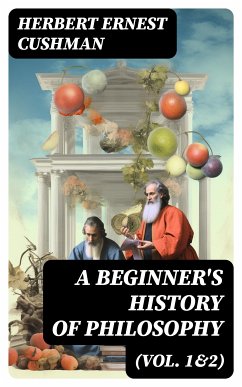Herbert Ernest Cushman's "A Beginner's History of Philosophy (Vol. 1&2)" offers a comprehensive and accessible exploration of philosophical thought from antiquity to modern times. Cushman's pedagogical style is characterized by clarity and conciseness, making complex ideas digestible for novices. The work is organized chronologically, allowing readers to engage with the evolution of philosophical concepts whilst situating them within their historical contexts. This dual volume serves not only as a primer for those new to philosophy but also as a reference for seasoned scholars seeking to revisit foundational ideas presented in a straightforward manner. Cushman, an esteemed educator and philosopher, dedicated much of his career to the dissemination of philosophical knowledge. His teaching experience and passion for philosophy informed his approach in writing these volumes, aiming to inspire a love for philosophical inquiry among students and lay readers alike. His background reflects an era that sought to make philosophy more democratized and accessible, countering prevailing notions that such discourse was reserved solely for the elite. This book is highly recommended for anyone seeking to understand the trajectory of philosophical thought, regardless of prior knowledge. Cushman's engaging narrative not only fosters intellectual curiosity but also encourages readers to reflect critically on the ideas that have shaped human understanding throughout history.
Dieser Download kann aus rechtlichen Gründen nur mit Rechnungsadresse in A, B, BG, CY, CZ, D, DK, EW, E, FIN, F, GR, H, IRL, I, LT, L, LR, M, NL, PL, P, R, S, SLO, SK ausgeliefert werden.









